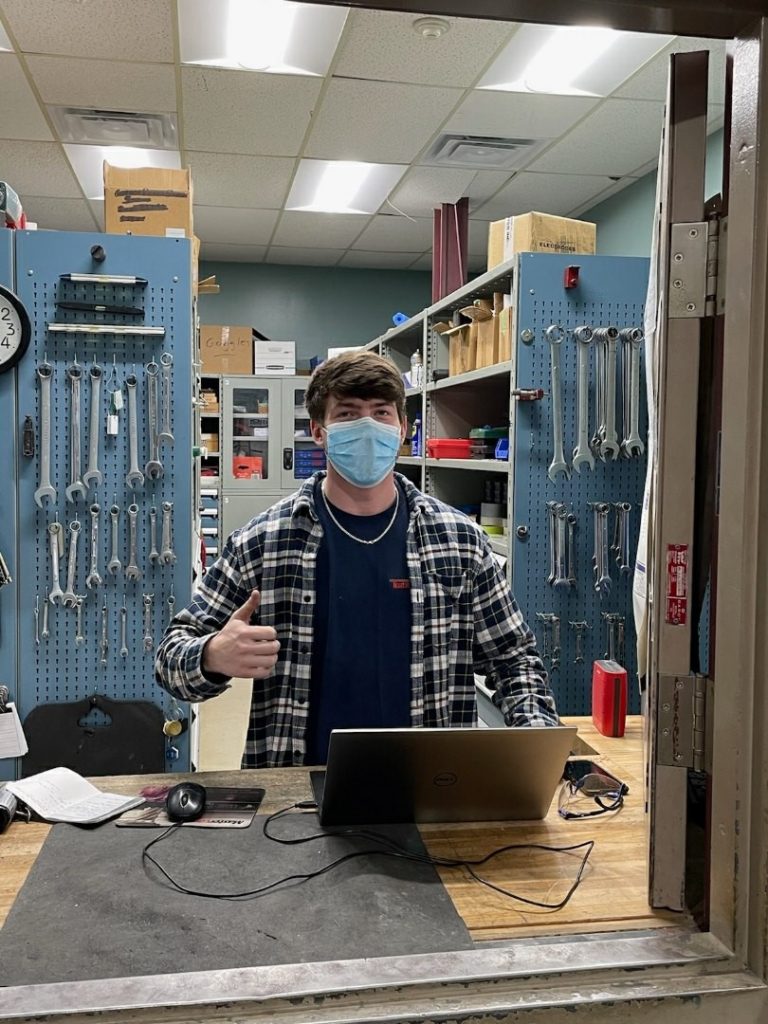Georgian wins silver at Skills Ontario Competition
May 19, 2022
Ryan Miller, a second-year Mechanical Technician – Precision Skills student from Moonstone, recently won a silver medal in Computer Numerical Control (CNC) machining at Skills Ontario, the largest skilled trades and technologies competition in the country. This year’s competition was virtual.
We caught up with Ryan and his coach, instructor Brett Austin, to learn about their experience.
How did you get selected to compete at Skills Ontario?
Ryan: I was working in the tool crib in the shop – standing behind the counter giving everyone their tools for class. Brent Belford, one of my instructors, approached me about the skills competition and told me a little bit about it. It sounded like good experience.

Because I worked in the shop, I had a little bit of extra time to practise between tasks. There were two of us selected to compete, myself and another student in the program.
What was training like?
Ryan: There are two different forms of practice that I would do. I would break it up into computer time – sort of looking at the drawing, and then programming the part using computer software. And the other half is machining – going to the machine and setting everything up as efficiently as possible to create the part.
In the precision skills program, they basically give us a set number of projects that students have to complete throughout the semester. I worked hard and ended up finishing my projects a bit early, so was able to use some class time to practise. I would stay late, as well.
Faculty were there to answer questions and support me through the process. Brett put a lot of time and effort into helping me prepare for the competition. I really appreciate that.
What was the virtual competition like?
Ryan:We were in the shop at the Barrie Campus all day. I got there at 7 a.m. and left at about 5 p.m. Once the Webex meeting started, there were about 15 or 16 participants – a combination of judges and student competitors from all over the province.
At 8 o’clock, we were able to open the drawing and were given one hour to program on the computers. And then after the hour was up, we could use the computer and the machines to execute.
It’s a two-part competition. The milling machine is one portion and the other is a lathe. We started off with the milling machine. You make it as far as you can get in the time allocated.
How did it feel to win?
Ryan:I received an email about a week after the competition ended. They said I’d won the silver medal! It was really exciting to receive the email and see that I had come second.
I’ve been in school for a few years, throughout COVID and lots of changes. It was really gratifying to see all the work and time I put in come to fruition.
What’s next, now that you are graduating?
Ryan: Actually, in the last week and a half I’ve just started an apprenticeship at a shop in Barrie, Nor-Tech Pattern Model & Mold. I’m really enjoying it. I help make larger rotational molds using a combination of CNC and manual machines.
Coming in second is definitely something to add to the resumé. Something I’m really proud to have accomplished and that I’ll take with me in my career.
Notes from coach Brett
Tell us about preparing for the Skills Ontario competition, from a faculty perspective.
Brett: The run up to competition is long and takes place for both student and trainer outside of normal hours. Since I’ve been involved in this role, we’ve trained three different candidates over the approximately four years. It takes many hours of practice, review and reflection to be competitive at a provincial level.
I’m happy to be involved and feel rewarded in seeing the young persons in trades abilities and confidence grow. Students who are selected for competition have already demonstrated skill inside their first year of studies, and quickly grow their abilities in the second year.
Students from the Mechanical Technician – Precision Skills program have won several medals. What makes the program successful?
Brett: The CNC program is exceptional because it’s a place where hands on, practical skills are the foundation that can allow you to take your creativity to the next level.
We have experienced, passionate leaders, teachers, technologists and support staff. We network with industry and actively adapt the program to meet the real-world needs of both students and employers. We have representatives of faculty from a wide range of backgrounds with complimentary skillsets who are driven to help students succeed. We have equipment representing current industrial standards for students to learn and practice on. We also have the support of local businesses and partners within the apprenticeship system.
Computer numerical control is a broad and growing designation which has impact on nearly every industry in Canada. Graduates can pursue a wide range of careers in manufacturing, automation, transportation and logistics.
What’s next?
Brett: The future of CNC at Georgian is bright. We have applicants from all over the world who bring their unique skillsets and ideas here with them. Trades in Canada are growing fields where employees are in high demand.
Thinking to future competitions is exciting. We’ve seen a lot of change, particularly with challenges related to the pandemic and learning how to complete training and qualifying remotely. If you’re driven you can be assured there is a place for you at Georgian, and a chance to compete in skills competitions where you’ll be working with equally passionate faculty and support.